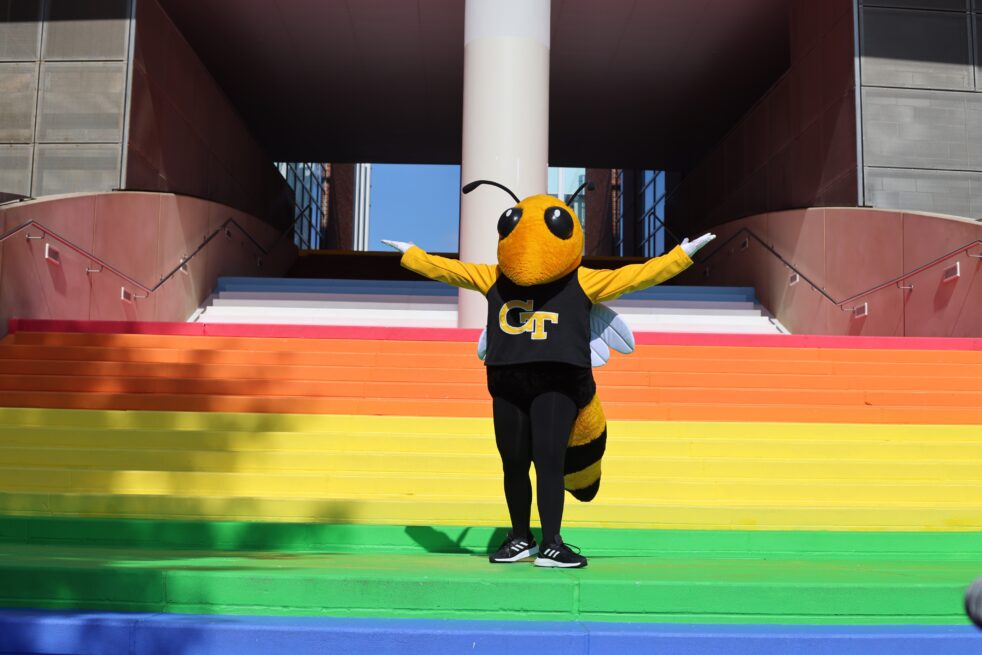On July 22, members of the Tech community came together to celebrate the unveiling of the Progress Pride Staircase, now located at the Klaus Advanced Computing Building.
The event was marked by speeches made by current Pride Alliance President Lisa Medford, fourth year PUBP, LGBTQIA Resource Center staff Camilla Frost-Brewer and Tegra Myanna, as well as a few words from Provost Mclaughlin and the project’s artist.
Medford led the way on the nearly year long Progress Pride Staircase project, which began as a conversation amongst various student leaders about the power of visual representation on campus and how they could work to bring more of that to Tech’s campus.
“We were having a really phenomenal discussion on visual representation and how we were going to accomplish that with a mural that included so many identities and it just sprang in to our own communities and how we celebrated ourselves,” said Medford.
“That led to me thinking, you know, we’re in the middle of Atlanta, we’re in the middle of an amazing city, and an amazing beautiful campus and adding a symbol of progress and pride with a design that represents intersex identity was an idea that came to mind and felt possible.”
Medford worked closely with and was supported by members of her Pride Alliance executive team, the LGBTQIA resource center and Tech administration to make her vision a reality.
The process was also made easier by Medford working alongside Sinet Adous, fifth-year INTA, who spear-headed her own diversity mural project that is currently in progress on Tech Walkway.
“You go to college and you don’t assume that you’ll be having conversations with your president and your provost and all these different departments trying to gather all of these people to make one project happen in away that, before Sinet’s project, hadn’t really happened before on this campus,” said Medford.
“You don’t think you’ll run into that many really cool adults in college that care about what students value and care about being really inclusive and that kind of support from administration and departments makes me have a greater appreciation of Georgia Tech and the ways in which we all work together to make some really needed initiatives happen.”
Students and staff members alike gathered under the hot Georgia sun to celebrate the official unveiling of the steps and listened in as Medford discussed the importance of the project for Tech’s LGBTQIA+ community.
“I want all of these collective efforts, the progress we’ve made together, to be permanently marked in full color on this cam-pus on stairs that move up.
It’s important for me to have LGBT people of color, the intersex community and the trans community all represented, making this visual one of the most inclusive in the nation,” Medford said.
The inclusiveness the staircase represents is well-needed in the Tech community, as noted by Lauren Paulson, a second year ME student who serves as head of Marketing and Graphic De-sign for Pride Alliance.
“When I was first considering going to Georgia Tech, part of me was a little worried as an out of state LGBT student going down to a school in Georgia,” Paulson said. I remember pulling up Georgia Tech’s Instagram and they had posted a photo of Buzz with the pride flag and that gave me a bit more confidence. I can’t imagine what seeing something like this on my campus tour would have meant to me. I remember walking around on my campus tour and seeing this little LGBT resource center tucked away in the corner and even that meant a ton to me back then.”
In her speech, Medford went on to note that the project was funded by the SGA Mental Health Joint Allocations Committee, which was formed in direct response to the shooting of Scout Schultz.
“Scout’s memory and their activism continues on in each of us, and brings recognition that there is still work that must be done. This Progress Staircase brings visual representation to the LGBTQ community. It pro-vides visibility to our queer community and it fosters a more accepting school environment.”
Scout’s impact was not underscored during the event as the artist behind the staircase, Ting, an alumni of the Institute, used their platform to speak out about the incident and Tech’s lack of adequate student mental health resources. “Until Georgia Tech GTPD defunds GTPD and invests in the well-being of its queer students, the pride staircase is merely a performative gesture,” said Ting.
Tech’s YDSA chapter distributed flyers containing information regarding their Counselors not Cops committee. The flyers also included QR codes that linked to the LGBTQIA Center Student Relief Fund and an article by LMC professor Dr. Hallie Lieberman titled “The Trigger Effect” that describes the Schultz incident and the after effects of the shooting surrounding Tech’s community.
For more information on LGBTQIA resources including the newly established LGBTQIA Center Student Relief Fund, please visit lgbtqia.gatech.edu/.
